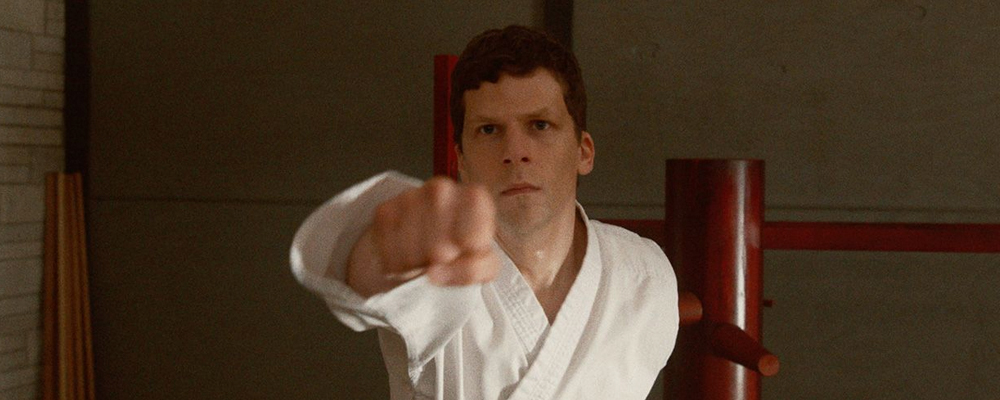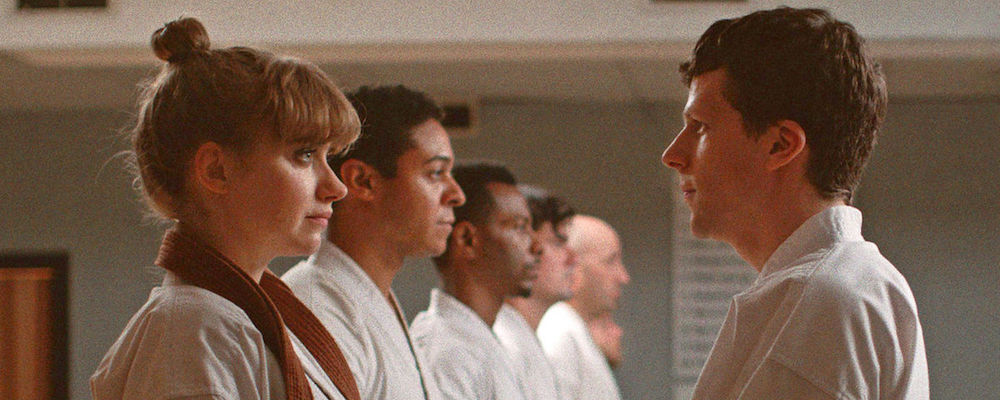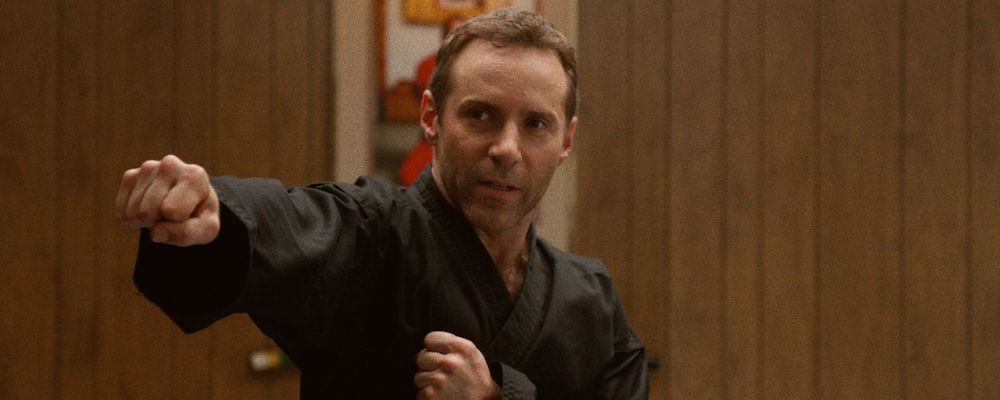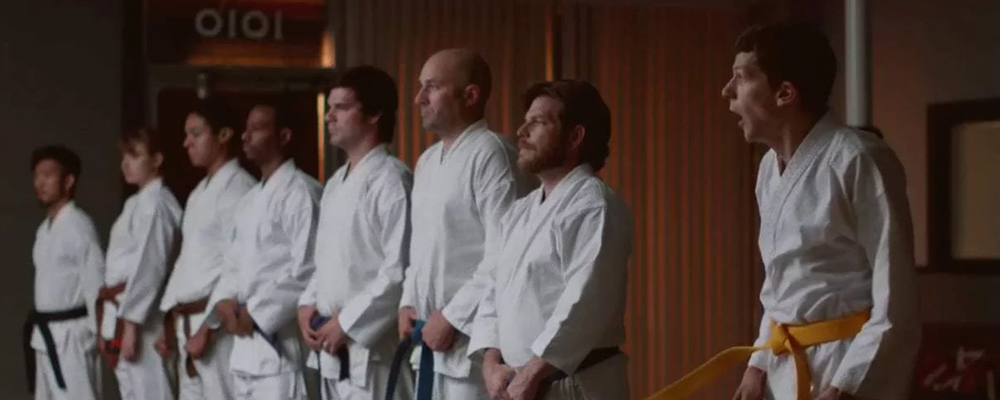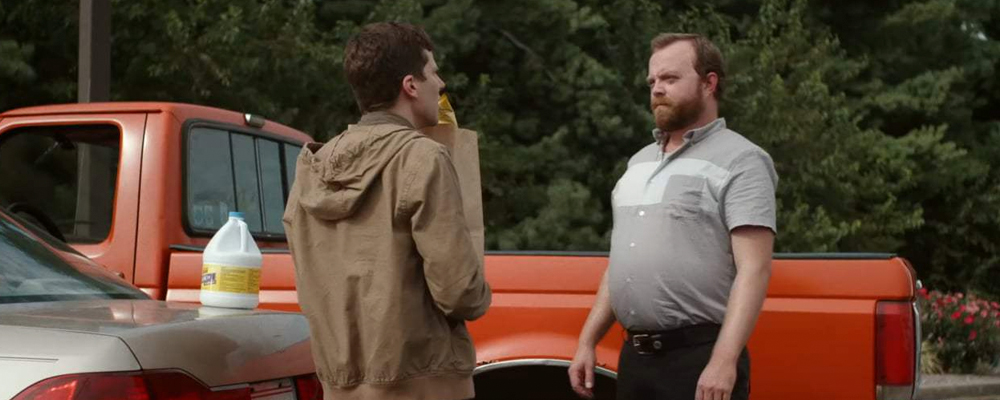‘The Art Of Self-Defense’ Is a Surreal Black Comedy Set in a Strange World of Toxic Men
Andrew Bundy
Practicing martial arts is all about discipline and self-improvement. “The Art of Self-Defense” only seems to care about the first of these things though. The new film, starring Jesse Eisenberg, is the opposite of a martial arts uplift movie. While the Academy Award-nominated actor has the potential to be an exceptional leading man, here his talents are exploited to their own detriment. Eisenberg plays Casey, a socially awkward and almost completely alienated, expense report auditor. Casey seems to have no meaning in his life outside his little dachshund and lonely apartment. He has grown so used to people making fun of him behind his back that he wants to learn French and move to France. One night, he goes out for dog food and is mugged by a group of thugs on motorcycles. He wakes up in the hospital, and after returning home, is too shell-shocked to leave the house at night alone. He soon stumbles across a karate dojo and is drawn to the mysterious sensei (Alessandro Nivola) running it.
Sensei has strange methods of teaching, to put it mildly, and rigid rules to follow. We never see him instruct his students. Instead, he tells them to kick with their fists and punch with their feet, spouting flavored stories of martial arts nonsense. Sensei claims that his master could destroy an opponent’s head using only his index finger, and he tells his school the tragic tale of how master was shot on a hiking trail by a hunter who mistook him for a bird. Sensei appears to see something of himself in Casey and takes a special interest in the anxious number cruncher. Outside karate, there are other philosophies he preaches to him as well, hobbies and ways of living to change his life for the better. He will teach Casey how to act like the kind of man he is afraid of. Drink black coffee, own a German Shepherd, do push-ups, and listen to heavy metal music with the car windows down. These are some of his lessons. The only other instructor at the dojo is Anna (Imogen Poots), who is utterly wasted in a role that feels more like a cipher than an actual character. Sensei allows her to teach the children’s class, but not change in the same room as the male students. There is something else going on at the martial arts school too, something Project Mayhem-esque, on top of the segregation. Sensei also runs an elitist night class for his favorite pupils. After attending his first elitist class, Casey is told he must endure something all men must go through. The trial is not exactly subtle and is quite insensitive.
Unlike “The Karate Kid,” “The Art of Self-Defense” is often dire and ominous rather than witty and charming, but it never really earns this. While the film is still a comedy, it’s a dry and bitter one, full of irony and self-loathing — a long-extended punchline delivered in complete deadpan. “Imprecise and boorish,” as Sensei would say ironically. The film is a blanket attempt to criticize toxic men who’ve been picked on for so long that only hate remains in their heart, and it sets out to do so by making fun of them. Sometimes the movie almost seems to be bullying its own subgenre, set in some surreal version of the ‘90s, solely inhabited by vapid and uneducated individuals. VHS tapes, bulky camcorders and heavy TVs with fuzzy lines are the only visible technology. The black comedy’s quirk driven coda is plenty precise, unfortunately it’s also obvious and on the nose. All these elements amount to a film that is strangely uncomfortable, despite having a relevant statement to make.
Overall, “The Art of Self-Defense” is well made, with fairly tight technical filmmaking. The compositional style is effectively hard-nosed, and the empty feeling imagery captured by writer-director Riley Stearns and his crew achieves what it sets out to. The vision almost works in a weird, atmospheric way, but makes for a real thematic head scratcher when one thinks about its overall implications. The artistic ideas behind the cinematography are sound, and the movie is most certainly trying for something specific with its tone, visuals and setting. Nivola also does his best to sell the ludicrous material. At least “The Art of Self-Defense” knows what kind of film it wants to be, but a strong sense of awareness only goes so far.
“The Art of Self-Defense” lacks any semblance of emotional vitality. Part of the problem is there’s virtually nothing redeemable about the narrative, or Eisenberg’s character, and Poots’ role is disheartening. Ultimately, the film is so in-your-face with its criticism of problematic male behavior and misogyny that it feels unnecessary. Everything is explained to the main character and the audience like a message in the form of a dojo lesson. As a result, “The Art of Self-Defense” plays more like a poorly told joke than any sort of meaningful commentary on macho martial arts culture. It ignores any discussion about the actual issues at hand and offers no alteration or solution to them either. What we are left with is a somewhat shallow and mean-spirited movie; a basic and bitter story about how a hapless loser becomes a bully. Perhaps this film is meant to be masochistic, but it’s tactless in its hollow humor about tough guy antics and hateful machismo. At its best, this work is stylish and disciplined as a slice of cinema, but at its worst the text almost comes off as a mockery of mental health. In the end, it becomes difficult to distinguish which problems “The Art of Self-Defense” takes seriously and which toxic tendencies it believes men can improve upon.
“The Art of Self-Defense” opens July 12 in select theaters.

